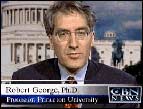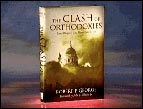The U.S. Senate is expected to weigh in soon on the issue of
human cloning, and President Bush has created a Council on Bioethics
to deal with this controversial issue. Pat Robertson spoke with Dr.
Robert George, a member of the President¡¯s Council on Bioethics,
about cloning and the influence of bioethics.
PAT ROBERTSON: With me from our news bureau in Washington is
Dr. Robert George. Dr. George is Professor of Jurisprudence at Princeton
University. He is the author of several books, including his newest,
The
Clash of Orthodoxies: Law, Religion and Morality in Crisis.
In January, Dr. George was named to President Bush's Council on Bioethics.
It¡¯s a pleasure to have you with us, thank you for being with us
Dr. George.
DR. ROBERT GEORGE: Thank you, Reverend Robertson, it¡¯s
a pleasure to be on the show.
ROBERTSON: You have dedicated a special chapter in your book
to the debate on human cloning. What are the real issues we are facing
with this cloning war?
GEORGE: Basically, the issue is whether we are going to respect
the sanctity of human life or whether we¡¯re going to bring new
human beings into existence precisely for the purpose of exploitation
so that we can take their body parts and stem cells and use them for
biomedical research with the result of the destruction of the nascent
human being.
ROBERTSON: Is there a distinction between so-called "therapeutic
cloning" and "reproductive cloning" like some of the
congressman are trying to make?
 GEORGE:
I¡¯m afraid that¡¯s a fraudulent distinction because all cloning
is reproductive, it brings into being a new human being, a new whole
living member of the species Homo sapiens. And no cloning is, strictly
speaking, therapeutic because the person who is subjected to experimentation,
the newly conceived human being, is not treated or benefited and rather
destroyed for the benefit of others. So strictly speaking there¡¯s
no therapeutic use there.
GEORGE:
I¡¯m afraid that¡¯s a fraudulent distinction because all cloning
is reproductive, it brings into being a new human being, a new whole
living member of the species Homo sapiens. And no cloning is, strictly
speaking, therapeutic because the person who is subjected to experimentation,
the newly conceived human being, is not treated or benefited and rather
destroyed for the benefit of others. So strictly speaking there¡¯s
no therapeutic use there.
ROBERTSON: You are part of an 18-member commission on bioethics.
Have you made a recommendation yet to the President on this issue?
GEORGE: We haven¡¯t yet Dr. Robertson, we are still in deliberations.
We are carefully preparing a report, debating a report, and there is
a mix of views on the council. Not all members of the council share
the President¡¯s views like I do and as I believe you do. There
will be further debate and discussion before we put anything before
the President.
ROBERTSON: The so-called bioethicists have really abandoned,
at least a number of them, the Judeo-Christian moral standards. How
do you introduce those standards into such a discussion?
GEORGE: I think we press away at the rational arguments for
the intrinsic dignity of human beings at every stage of development.
The very people who are today calling into question the dignity of the
newly conceived human being are the first to resist, as they should,
discrimination based on race or ethnicity or sex or any other factor
like that. They should be equally vigilant and we should demand they
resist the idea of discrimination and exploitation based on age or size
or stage of development or condition of dependency. Those are just as
irrational as bases for discrimination and exploitation as race or sex
or any other factor. So what we need to do is call them to consistency,
rational consistency and logical consistency with what they proclaim
to be their own principles.
ROBERTSON: Your book is entitled The Clash of Orthodoxies:
Law, Religion, and Morality in Crisis, is there a crisis and how
do you see it? Which orthodoxies are coming into conflict as you see
it?
 GEORGE:
The principle concern of my book The Clash of Orthodoxies is
to argue that, far from being a conflict between irrational faith and
the forces of pure reason, contemporary cultural disputes over the sanctity
of life and institution of marriage and the family really reflect two
competing worldviews. And in fact, I argue that the Christian worldview,
far from being based on irrational faith, can be shown to be, as I try
to show it to be in the book, rationally superior to what I call the
secularist orthodoxy, a worldview that claims to be based entirely on
reason but in fact is filled with internal contradictions and logical
inconsistencies which when brought to light show that secular liberalism,
the secularist orthodoxy that prevails in universities and the journalistic
establishment, professional associations, is in fact a failure at the
bar of reason itself.
GEORGE:
The principle concern of my book The Clash of Orthodoxies is
to argue that, far from being a conflict between irrational faith and
the forces of pure reason, contemporary cultural disputes over the sanctity
of life and institution of marriage and the family really reflect two
competing worldviews. And in fact, I argue that the Christian worldview,
far from being based on irrational faith, can be shown to be, as I try
to show it to be in the book, rationally superior to what I call the
secularist orthodoxy, a worldview that claims to be based entirely on
reason but in fact is filled with internal contradictions and logical
inconsistencies which when brought to light show that secular liberalism,
the secularist orthodoxy that prevails in universities and the journalistic
establishment, professional associations, is in fact a failure at the
bar of reason itself.
ROBERTSON: There seems to be a vendetta against God in our society
on the part of the so-called intelligencia. Have they succeeded or is
there a resurgence of Christianity and religious belief in your view?
GEORGE: Well, it¡¯s interesting. Of course, the Judeo-Christian
morality is a minority position at least in the circles in which I ordinarily
lead my life, in the university environment, professional academic associations
and so forth. But it¡¯s not as if Christians and Orthodox Jews and
other believers are not present in the academy. Too often their voices
are not heard, but they are there and there are a number of distinguished
contemporary philosophers, just to take one field, philosophers who
are believing Christians and converts to Christian faith. In fact, some
of the most eminent philosophers in the world; begin the list with Alasdair
MacIntyre, Michael Dummett, the late Elizabeth Anscombe was a devout
Christian believer. So those Christian voices are there but they need
to be heard.
ROBERTSON: Well, thank you very much for presenting this. And
ladies and gentlemen, you might find this book interesting. The
Clash of Orthodoxies by Dr. George.